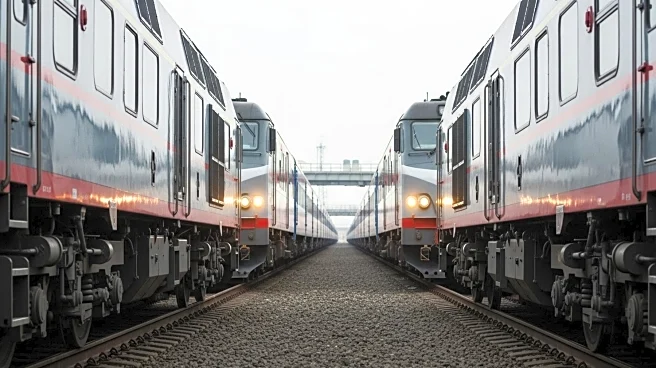What is the story about?
What's Happening?
The Rail Customer Coalition (RCC), representing various industries reliant on railroads, has expressed concerns over the proposed merger between Union Pacific and Norfolk Southern. The RCC sent a letter to the Surface Transportation Board (STB), highlighting potential negative impacts of the merger, including reduced competition and increased costs. The merger, valued at $85 billion, aims to create the first transcontinental railroad in the U.S., connecting 50,000 route miles across 43 states. The RCC argues that past rail mergers have led to service degradation, higher costs, and job losses, and fears this merger could further consolidate the industry, leaving shippers with fewer options. The STB's review of the merger will be the first under new guidelines that prioritize competition and service enhancement.
Why It's Important?
The proposed merger between Union Pacific and Norfolk Southern could significantly impact the U.S. rail industry by reducing competition. The RCC warns that this consolidation may lead to higher costs for shippers and decreased service quality, which could affect American manufacturing and global trade competitiveness. The merger contradicts the President's executive orders aimed at promoting economic growth and curbing monopolistic practices. Enhanced competition in the rail industry is crucial for producing more goods domestically and maintaining U.S. leadership in global trade. The STB's decision on the merger will be pivotal in shaping the future of freight rail competition and supply chain stability.
What's Next?
The STB will rigorously evaluate the merger's potential impacts, focusing on enhancing competition and protecting shippers and consumers. The RCC urges the STB to take meaningful action to prevent adverse effects from further consolidation. The merger review presents an opportunity to prioritize freight rail competition, ensuring that any transaction expands access to competitive rail services. Stakeholders, including shippers and industry groups, will continue to voice their concerns and influence the STB's decision-making process.
Beyond the Headlines
The merger raises broader questions about the balance between industry consolidation and competition. It highlights the ongoing struggle between railroads seeking efficiency and shippers demanding fair rates and reliable service. The RCC's opposition reflects a growing concern about the concentration of market power in the rail industry, which could have long-term implications for U.S. economic policy and trade dynamics.















